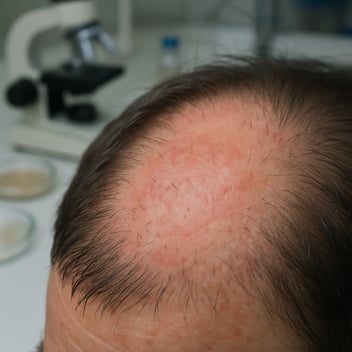Primary scarring alopecias refer to a group of hair disorders that lead to permanent hair loss.
These disorders include frontal fibrosing alopecia (FFA), lichen planopilaris (LPP), central
centrifugal cicatricial alopecia (CCCA). Their exact causes are still unclear, however,
environmental triggers, genetics and immune system dysfunction are thought to play a role.
Understanding what other health conditions or comorbidities are associated to these alopecias
can help improve early detection and guide treatment strategies.
Hurtado et al. conducted a retrospective chart review of 240 adults diagnosed with scarring
alopecia who were seen at public and private dermatology clinics in Los Angeles between 2018
and 2022. All participants were diagnosed clinically or by hair biopsy. The median age of
participants was 50.8 years, 86.7 % were female and 41.7% had LPP/FFA.
The study found that many patients had other medical issues. 56.6% were vitamin D deficient,
68% had at least one metabolic condition such as high blood pressure, high cholesterol, obesity
or prediabetes. 35.7% experienced anxiety or depression and women had higher averages of
uterine fibroids, thyroid disease, anemia and breast cancer compared to the general population.
The study also revealed patterns by primary alopecia type. That is, patients with CCCA were
more likely to have traction alopecia, androgenetic hair loss and vitamin D deficiency. LPP/FFA
patients were more likely to have thyroid conditions, heart disease, autoimmune disorders like
lupus or vitiligo. Patients with discoid lupus erythematous had strongest links to other
autoimmune diseases and those with mixed scarring alopecia had an increase rate of keloids and
fibroids.
It is important to note that correlation does not equal causation. Although these conditions often
appear together it does not mean one causes the other. The results of this study highlight that
dermatologist and other healthcare providers should obtain a thorough medical history when
evaluating patients with primary scarring alopecia. An integrative approach of treating alopecia
alongside metabolic, gynecologic and psychiatric conditions may improve hair health and overall
well-being.
Summarized by: Esema Idemudia (The Ohio State University College of Medicine) and
Stephanie Trovato, MD | Board-Certified Dermatologist | Cleveland Clinic
Reference: Mora Hurtado, A.C., Gonzalez, S., Syder, N.C., Manasyan, A., Thompson, T., Harvey, L.,
Rodman, J. and Elbuluk, N. (2025), Comorbidities of Primary Scarring Alopecias: A Retrospective Multi-Site
Cross-Sectional Study. JEADV Clinical Practice, 4: 482-494. https://doi.org/10.1002/jvc2.70015



